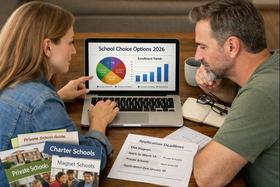Serving 21 students in grades 9-12, Mts Pease Academy ranks in the bottom 50% of all schools in Minnesota for overall test scores (math proficiency is bottom 50%, and reading proficiency is bottom 50%).
The percentage of students achieving proficiency in math is <50% (which is higher than the Minnesota state average of 46%). The percentage of students achieving proficiency in reading/language arts is <50% (which is lower than the Minnesota state average of 60%).
The student-teacher ratio of 11:1 is lower than the Minnesota state level of 13:1.
Minority enrollment is 24% of the student body (majority Black and Asian), which is lower than the Minnesota state average of 39% (majority Black).
Quick Facts (2026)
- School Type: Charter School
- Grades: 9-12
- Enrollment: 21 students
- Student-Teacher Ratio: 11:1
- Minority Enrollment: 24%
- Graduation Rate: <50% (Btm 50% in MN)
- Math Proficiency: <50% (Top 50%)
- Reading Proficiency: <50% (Top 1%)
- Source: National Center for Education Statistics (NCES), MN Dept. of Education
Top Rankings
Mts Pease Academy ranks among the top 20% of public schools in Minnesota for:
Category
Attribute
Community Size
Student Attention
School Overview
Mts Pease Academy's student population of 21 students has declined by 16% over five school years.
The teacher population of 2 teachers has stayed relatively flat over five school years.
School Type
Grades Offered
Grades 9-12
(No virtual instruction)
(No virtual instruction)
Total Students
21 students
Gender %
Total Classroom Teachers
2 teachers
Year Founded
1989
Last Day of School
Thu. May 28, 2026
School Motto
Peers Enjoying A Sober Education
School Rankings
The diversity score of Mts Pease Academy is 0.41, which is less than the diversity score at state average of 0.59. The school's diversity has stayed relatively flat over five school years.
Math Test Scores (% Proficient)
<50%
46%
Reading/Language Arts Test Scores (% Proficient)
(15-16)<50%
60%
Student-Teacher Ratio
11:1
13:1
American Indian
5%
2%
Asian
5%
7%
Hispanic
n/a
12%
Black
5%
12%
White
76%
61%
Hawaiian
n/a
n/a
Two or more races
9%
6%
All Ethnic Groups
Graduation Rate
<50%
84%
Participates in the National School Lunch Program (NSLP)
Yes
Eligible for Free Lunch
43%
36%
Eligible for Reduced Lunch
11%
8%
School Statewide Testing
School District Name
Source: National Center for Education Statistics (NCES), MN Dept. of Education
Profile last updated: 02/09/2025
Frequently Asked Questions
What percent of students have achieved state testing proficiency in math and reading?
<50% of students have achieved math proficiency (compared to the 46% MN state average), while <50% of students have achieved reading proficiency (compared to the 60% MN state average).
What is the graduation rate of Mts Pease Academy?
The graduation rate of Mts Pease Academy is 50%, which is lower than the Minnesota state average of 84%.
How many students attend Mts Pease Academy?
21 students attend Mts Pease Academy.
What is the racial composition of the student body?
76% of Mts Pease Academy students are White, 9% of students are Two or more races, 5% of students are American Indian, 5% of students are Asian, and 5% of students are Black.
What is the student-teacher ratio of Mts Pease Academy?
Mts Pease Academy has a student ration of 11:1, which is lower than the Minnesota state average of 13:1.
What grades does Mts Pease Academy offer ?
Mts Pease Academy offers enrollment in grades 9-12 (No virtual instruction).
What school district is Mts Pease Academy part of?
Mts Pease Academy is part of Minnesota Transitions Charter School District.
In what neighborhood is Mts Pease Academy located?
Mts Pease Academy is located in the Marcy Holmes neighborhood of Minneapolis, MN.
School Reviews
Review Mts Pease Academy. Reviews should be a few sentences in length. Please include any comments on:
- Quality of academic programs, teachers, and facilities
- Availability of music, art, sports and other extracurricular activities
Recent Articles

Back-to-School Tech & Online Learning Readiness Checklist
A 2026 guide to back-to-school tech & online learning readiness, helping families prepare devices, connectivity, skills, and safety.

How Public Schools Prepare for College in High School
Learn how public schools prepare for college and what parents should look for as students begin high school. Updated for 2026.

School Choice in 2026: What Parents Must Know
Explore how school choice is reshaping U.S. education in 2026, with updated trends, enrollment data, costs, policies, and practical guidance for parents.





